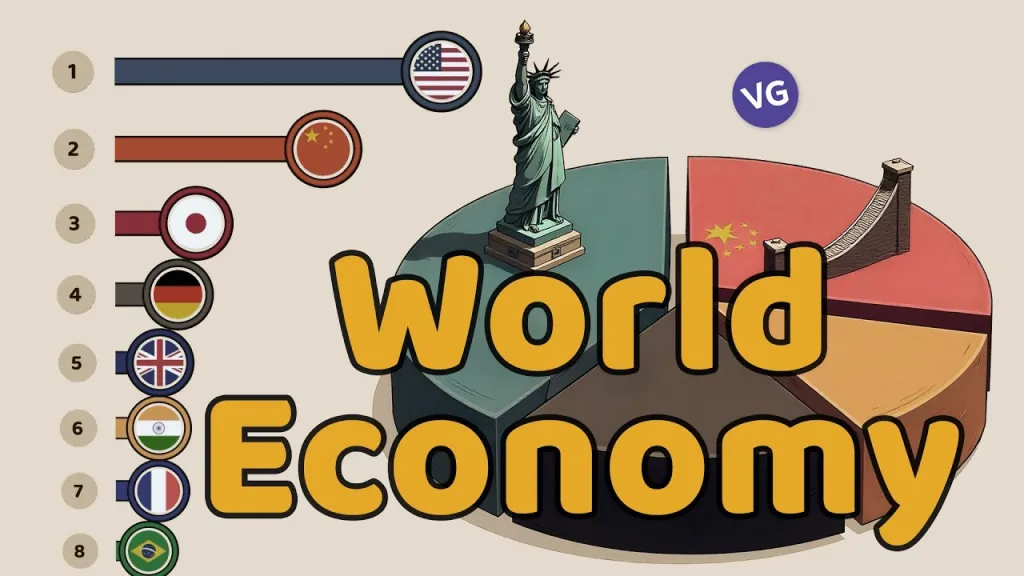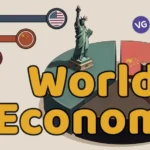World economics refers to the study of how economies across different countries interact, grow, and influence each other. In 2025, global economic conditions are shifting rapidly due to trade tensions, technological changes, and new fiscal policies. Understanding world economics is crucial for policymakers, investors, and the general public.
The health of world economics is often measured by indicators like GDP growth, inflation rates, employment, and international trade performance. In recent years, countries have faced significant disruptions, from the COVID-19 pandemic to supply chain breakdowns and rising inflation. Today, the focus is on recovery, digital transformation, and adapting to a new era of economic uncertainty.
Table of Contents
ToggleGlobal GDP Growth Trends
One of the most important indicators in world economics is global GDP growth. In 2025, most international agencies project a modest global growth rate. According to the IMF and World Bank, global GDP is expected to grow at around 2.3% to 2.7%, slightly down from previous years.
This slowdown is primarily due to ongoing trade disputes, tighter monetary policies, and reduced consumer demand in developed nations. Emerging economies, especially in Asia and Africa, continue to drive much of the global expansion despite challenges.
Inflation and Interest Rates
Inflation remains a central concern in the global economy. Many countries, especially in Europe and North America, are still facing higher-than-targeted inflation rates. Central banks have responded by raising interest rates to stabilize prices.
The U.S. Federal Reserve and the European Central Bank have both maintained restrictive monetary policies in early 2025. These measures are helping control inflation but also slowing down investment and consumption, creating a delicate balance in world economics.
The Role of International Trade
International trade plays a vital role in shaping world economics. However, geopolitical tensions, trade wars, and nationalistic policies are creating barriers to free trade. The ongoing U.S.-China trade conflict and increasing tariffs on goods like steel and electronics are causing disruptions in global supply chains.
Many countries are now reevaluating their trade strategies, focusing on regional agreements and local production. This shift toward deglobalization is changing the dynamics of how economies collaborate and compete on a global scale.
Digital Transformation and the Global Economy
Technology is reshaping world economics. The rise of artificial intelligence, automation, and blockchain is transforming industries, labor markets, and financial systems. Digital economies are growing rapidly, with sectors like e-commerce, fintech, and remote services playing an increasingly important role.
Governments are investing in digital infrastructure and cybersecurity to stay competitive. At the same time, there’s a growing need for regulations to ensure ethical use of data and AI in economic activities.
Labor Markets and Employment Trends
Employment trends vary across regions. In developed countries, labor shortages and aging populations are major concerns. Meanwhile, developing nations are dealing with youth unemployment and skills mismatches.
Remote work, the gig economy, and automation are also influencing global employment trends. Policymakers are focusing on education reform, reskilling, and inclusive job creation to address these shifts.
Environmental and Climate Economic Impact
World economics is also affected by climate change. Environmental disruptions are impacting agriculture, infrastructure, and migration patterns. As a result, countries are investing in green energy, sustainable development, and carbon-neutral initiatives.
The economic cost of climate change is increasing, prompting global cooperation through frameworks like the Paris Agreement. Businesses are adapting to environmental regulations, and sustainability is becoming a core part of long-term economic strategies.
Fiscal Policies and Global Debt
Public debt levels are rising worldwide. Governments increased spending during the pandemic, and now many are facing high deficits. In 2025, countries are trying to balance economic support with fiscal responsibility.
Tax reforms, budget adjustments, and international loans are common tools being used. High debt levels can limit future spending and investment, making it a crucial focus in world economics discussions.
Economic Challenges by Region
-
North America: Slowing consumer demand, high interest rates, and political uncertainty affect economic stability.
-
Europe: Trade disruptions and energy concerns continue to challenge economic growth.
-
Asia-Pacific: China, India, and Southeast Asia are leading growth, but are vulnerable to external shocks.
-
Africa: Investment in infrastructure and technology is supporting progress, though debt and governance issues persist.
-
Latin America: Resource-based economies are recovering, but inflation and inequality remain challenges.
Each region faces unique obstacles, but together they form the complex puzzle of world economics in 2025.
Future Outlook for World Economics
Looking ahead, the future of world economics depends on multiple factors. Global cooperation, climate resilience, technological adaptation, and inclusive policies will be key drivers. Economic resilience will rely on flexible systems, diversified supply chains, and sustainable growth models.
While the global economic environment remains uncertain, there are opportunities for innovation, trade partnerships, and economic reform. The ability of governments and institutions to respond effectively will determine the long-term health of the world economy.
Conclusion
World economics in 2025 reflects a mixture of progress and challenges. Slower growth, inflationary pressures, evolving trade relationships, and technological advances are reshaping the global economy. Staying informed about world economics is essential for making strategic decisions in business, finance, and policy.
With careful planning and global cooperation, the world can navigate these changes and move toward a more stable and prosperous future.
















Leave a comment